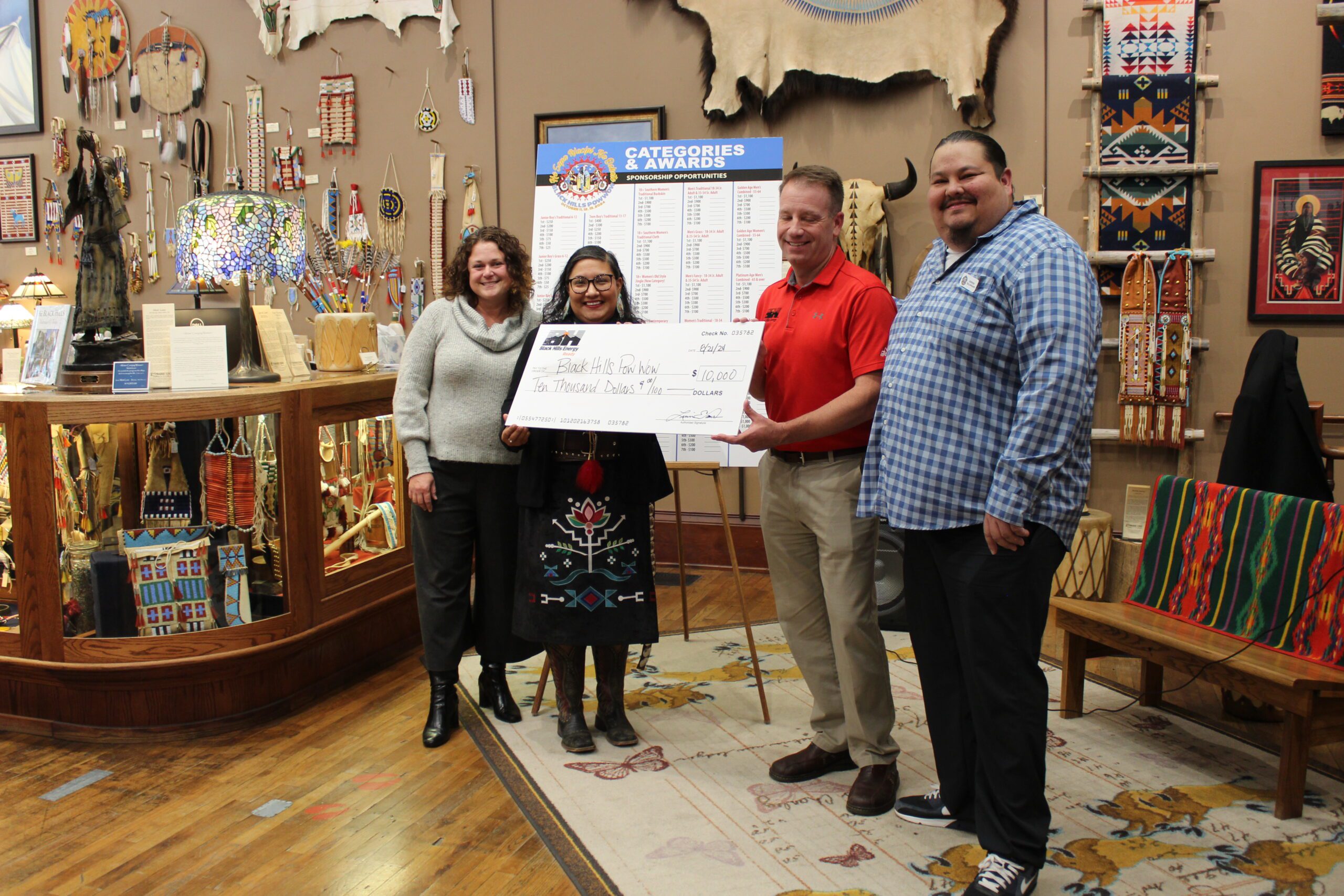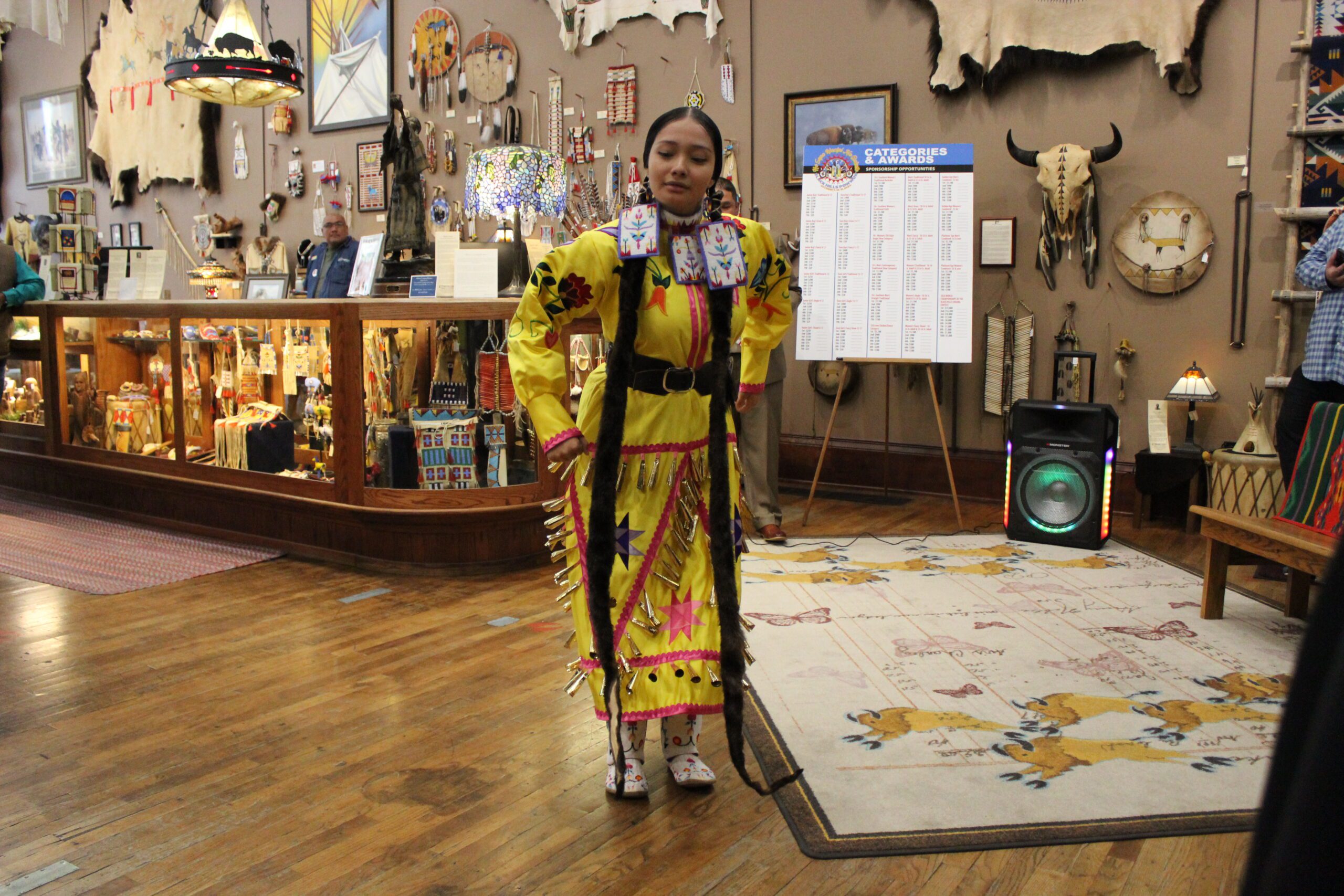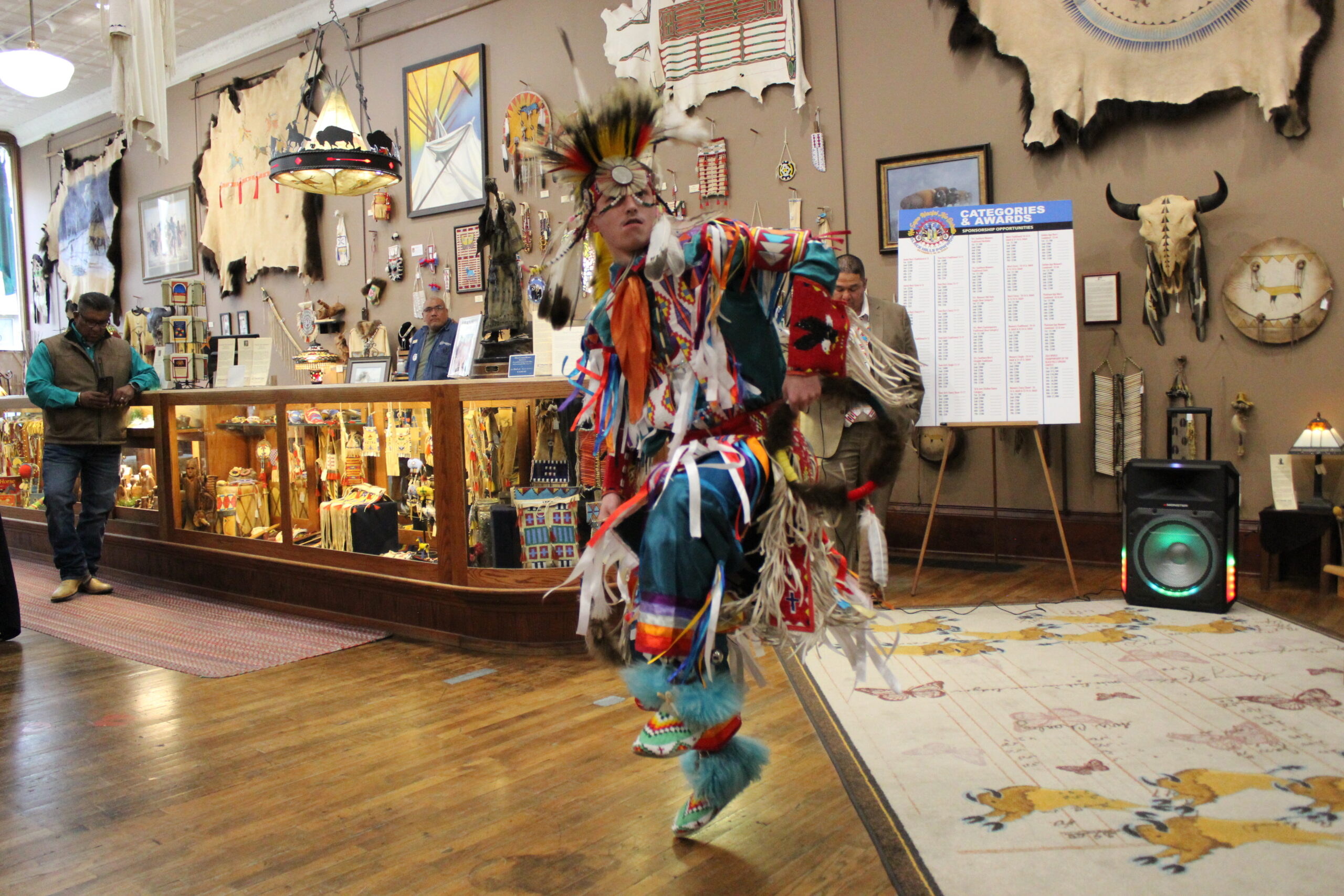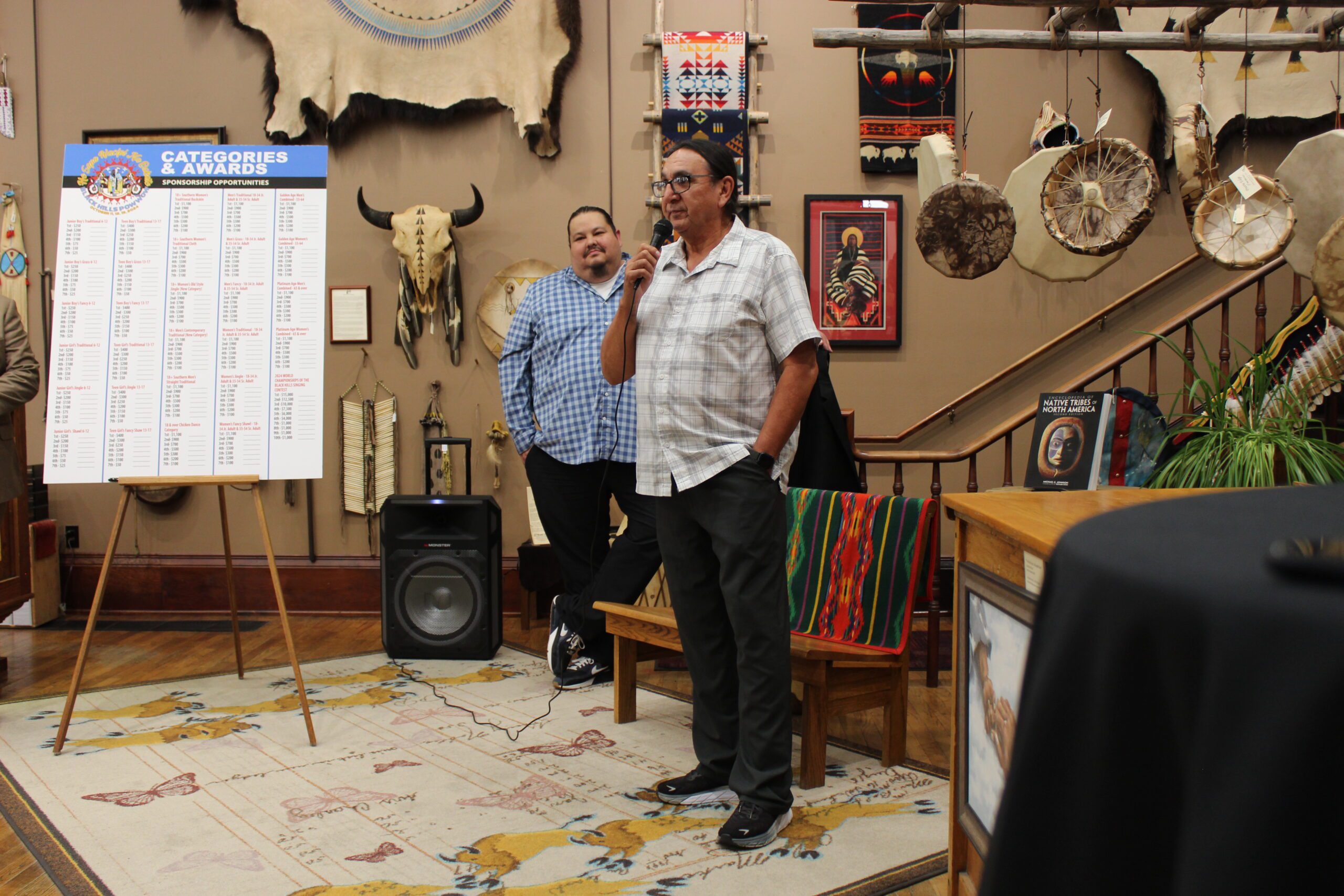Celebrating community and culture: The journey and success of the Black Hills Powwow

Representatives from Black Hills Energy presented a $10,000 check to Black Hills Powwow Vice-President Dew Bad Warrior-Ganje and President Steven Yellow Hawk during the fundraising event at Prairie Edge, highlighting their support for this celebration of culture and community. (Photo by Ernestine Anunkasan Hopa)
RAPID CITY – A network of Black Hills Powwow supporters gathered last month at the beautiful Prairie Edge Gallery, celebrated for its rich cultural experience and impressive collection of traditional and contemporary Native American art, crafts, and artifacts.
Steven Yellow Hawk, President of the Black Hills Powwow, announced at the fundraising event, amidst committed sponsors who have steadfastly contributed to its growth, helping to establish it as one of the premier Native American events in the country.
Yellow Hawk, who thanked Visit Rapid City for getting the word out, said he wanted to share a story about his personal journey that brought him to where he is today.
“I moved here to Rapid City in 1987, born on the reservation in Eagle Butte, South Dakota. I was raised by my grandparents, Doctor Gerald and Johanna Yellow Hawk.” His grandfather, a minister and district superintendent for the Wesleyan Native American Ministry, often took Steven on long journeys. Together, the family traveled the countryside in their trusty white Chevy Caprice Classic, clocking over 300,000 miles as they visited churches across the nation.
Yellow Hawk said he attended schools in the Rapid City School District, Blackhawk Elementary, Dakota Middle School, Stevens High School, and completing his education at Lakota Christian Academy.
Yellow Hawk recounted a pivotal moment, “When I was 14 years old, I switched schools, from Stevens High School to this private Christian school, and it really inspired me to learn more about my culture. One day, I said to my grandpa, ‘Grandpa, I want to Indian dance. I want to put on those beads and those feathers and I want to dance to that drum.’”
His grandpa didn’t respond right away but little did he know that in the quietude of their basement his grandfather had begun working on Steven’s very first traditional dance regalia, and he completed it just in time for the Black Hills powwow.
As they neared the Rushmore Plaza Civic Center, the venue for the powwow, Steven admitted that he felt a bit nervous. He recalls that his grandfather apologized for not being able to teach him how to dance. Instead, he took him to the powwow to observe traditional dancers, whom he described as warriors, highlighting their respect for children and elders.
“So I remember my first step into that powwow circle at the Black Hills powwow. I remember I felt so proud because I knew I was starting to learn some of the traditional dances of my people, and later on in life, I realized that was the beginning of a journey, and that’s a journey that has brought us to where we are here today.”
As he reflected on his journey, he shared how it led him to take on leadership roles at the powwow. “About 14 or 15 years ago, the board asked me to oversee the hand games for the powwow. Later, they appointed me as interim president, and eventually, I became the president. It has been an incredible journey.”
When the new board took over the powwow, it was struggling and seemed to be dying as a celebration he said. Recognizing the need for change, the members collaborated to brainstorm ideas and make decisions to revitalize the event. Each year, they worked on introducing new elements to draw in more attendees and enhance the excitement and appeal of the celebration. Their hard work has paid off, as last year’s event became “the largest Black Hills Powwow we’ve ever had here in the Black Hills. And that’s thanks to all of you,” Yellow Hawk said.
Yellow Hawk acknowledged the numerous individuals in attendance that evening who had played a crucial role in the behind-the-scenes efforts, including fundraising and securing support for the powwow.
“Unlike others, we don’t have a reservation, a tribal council, or a casino funding us. All the money for the powwow comes from the community through ticket sales and sponsorships from organizations and foundations that believe in our mission,” he said.
Yellow Hawk acknowledged that the Black Hills powwow is a beautiful celebration that he takes great pride in, and that he is grateful to work with the dedicated board of directors and that they strive to make it better for future generations. “It’ll be our time to hand it off to the next generation, and we want them to know what it takes to join in on such a beautiful event.”
Yellow Hawk gave special thanks to Whitney Rencountre for his exceptional voice as the Eyapaha for the Powwow and his invaluable guidance throughout the years. He also acknowledged all the Black Hills Powwow Board Members, Vice President Dew Bad Warrior-Ganje, Treasurer Lisa Hatten, Director Mitch Brewer, Director Sandor Iron Rope, and Director Nick Hernandez.
Then, a couple of exhibition dances took place, beginning with Sofia Rencountre performing the jingle dress dance, followed by Avant Yellow Hawk showcasing the grass dance. Sofia, clad in her stunning jingle dress, captivated the audience with her graceful movements. On the other hand, Avant Yellow Hawk brought a spirited energy with his performance of the grass dance. The audience was left invigorated, eagerly anticipating the full powwow where the spirit of community, tradition, and celebration would come alive in a rich tapestry of color, music, and dance.
Dan Tribby, former manager of Prairie Edge, expressed the significance of the powwow as a cherished family event in the Black Hills. He emphasized the community spirit that unites attendees from various tribes, highlighting the opportunity for businesses to engage their employees by sponsoring tickets and gifts for the event. Tribby described the powwow experience as magnificent, noting the powerful impact of the drumming and the joy it brings. He urged others to participate and support the event, promising that they would not regret it due to the unique and uplifting atmosphere. He announced the Dakota Charitable Foundation’s sponsorship of $20,000 and encouraged other businesses to support the Powwow.
Mimi, daughter of Prairie Edge founder Ray Hildebrandt, expressed her gratitude during the event, emphasizing the honor of being involved in the daily operations of Prairie Edge. She highlighted the significance of sharing culture and described attending a powwow as a deeply moving experience that resonates deeply with the soul and body.
Mimi shared heartfelt reflections about her father, stating, “I’m sure a lot of you knew my dad. He and my mom started this place and built a relationship with the native people here. I can remember the first time he took me to the powwow—the energy, the goosebumps, the joy on everybody’s face, including my dad. He brought me so much joy, and I hope to continue that spirit.”
Yellow Hawk then acknowledged Visit Rapid City for generously providing $16,000 worth of complimentary rooms for the Powwow weekend.
Yellow Hawk also thanked representatives from Black Hills Energy, Scull Construction, Monument Health, Lake Area SDSU Wokini Initiatives, NDN Collective, Great Plains Tribal Leaders Health Board, Security First Bank, The Monument and members of the Lakota Nation Invitational Board for their generous support and financial contributions.
Gene Tyon, Executive Director of Oaye Luta Okolakiciye, and renowned Fancy Dancer then shared an intriguing and invaluable historical insight into the powwows that have taken place within the Rapid City Indian community.
“I remember a long time ago, just down the street, there used to be the Rapid City, City Auditorium, where powwows were held by the War Eagle Dance Club, with Mr. Phil Dudley serving as the chairman. That was quite some time ago. Then they had the powwow where West Middle School is, it was an outdoor powwow. I had an older brother that followed in the powwow circuit.”
“Eventually, it started right across the street here at the tennis courts, before moving to the Civic Center. It’s incredible to see how much it has grown and where it stands today. And on a personal note, Steven is my hunka son, so I hope I can score a free ticket—just kidding! We will be securing some for our organizations. Pilamaye.”
The collective contributions from all these businesses and organizations have been vital in transforming the Black Hills Powwow into the successful and memorable celebration of culture and community that it has become today.
(Contact Ernestine Anunkasan Hopa at editor@nativesunnews.today)
The post Celebrating community and culture: The journey and success of the Black Hills Powwow first appeared on Native Sun News Today.
Tags: Top News



